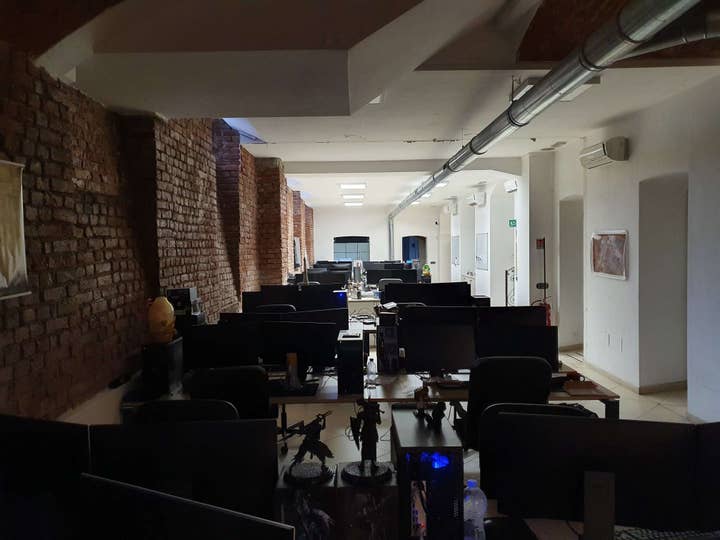Making games in lockdown: How Italy's developers are coping with COVID-19
We speak to the studios that have been quarantined as the Italian government increases its efforts to combat the virus
Of all the Western nations, Italy has been the most severely impacted by the spread of novel coronavirus (COVID-19).
The number of deaths the disease has caused in the country is now nearly 3,000, with a total of 35,713 confirmed cases and more than 4,000 recoveries. Italy is second only to China in terms of how badly COVID-19 has affected its population.
As such, the Italian government has taken drastic measures to prevent the spread of the virus, including a nationwide lockdown that has been in place for almost two weeks. All public events have been banned, all non-urgent travel restricted, and all non-essential businesses have been closed down.
Among the latter are the nation's games developers and publishers, all of which have been "significantly impacted," according to Thalita Malagò, director general of Italian trade body IIDEA.

"The attendance of national and international gaming business events is paramount for several Italian developers to seal deals with publishers and become visible to media," she tells GamesIndustry.biz.
"Esports business operators, such as tournament organizers and teams, usually live on sponsorships mostly related to consumer events. Postponement or cancellation of main events will have a major effect on business operators through all of 2020 at least.
"However, there is also a silver lining: Italians are also choosing video games, as well as music and movies, to spend time at home."
Racing specialist Milestone, one of the nation's biggest games firms, felt the effects as early as January, when a Chinese outsourcer had to delay the work it was doing. Last month, around 15% of Milestone's staff were forced to stay at home because they had been in contact with people in affected areas. And, following the lockdown, the company has been forced to work remotely.
"Smart working is not simple," managing director Luisa Bixio says. "There are several issues mostly in production areas, linked to console dev kits, neural AI training and so on. But I can say I'm very happy with how Milestone's people have reacted: everybody is doing the maximum and we are all united in managing this situation as best we can."
Developer MixedBag has found it a little easier to adapt to remote working; partly because there is only 11 people on the team, and partly because it just shipped an important milestone and was gearing up to work on new ideas anyway.
"Making video games is a team effort, and some activities are slower when done remotely"
Marco Ponte, RaceWard Studio
"Working remotely is going okay, for now," says CEO Mauro Fanelli. "We've been able to operate quite normally. We have a good pipeline and we're using a wide array of collaborative tools, so for now, we're not feeling the impact too much."
RaceWard Studio has a larger team of 35 people and is based in Milan, close to the epicenter for the virus in Italy. With the whole studio now working remotely, CEO Marco Ponte tells us he expects a 30% decrease in productivity after the first week, and around 15% to 20% in the coming weeks.
"Making video games is a team effort, and some activities are slower when done remotely," he explains. "Moreover, from a project management and communication point of view, further efforts are required to oversee, validate and support the remote work everybody is doing -- consequently, the managers and producers have a greater load to manage than usual.
"Lockdown has also imposed the closure of the schools and many other activities. In addition to the company and the individual developer, this situation also affects the families. We work remotely, but under an unexpected situation: not wanted nor built to be such. So, it is not uncommon for a video conference to be paused in order to manage some familial aspect, especially if in the presence of young children."
RaceWard has taken steps to shore itself up for home working, such as increasing office internet bandwidth to better support remote access, and purchasing additional workstations so developers have the hardware they need.
"We also work on maintaining teamwork," says Ponte. "We're trying to maintain at least visual contact between the developers, organising different video conferences during the day, starting with the good morning message with which we kick-off our days. Chat works, but continuing to see your teammate helps more at this stage."

Studio Evil began putting remote working measures in place a few days before the lockdown began, but its team of 11 is still "settling into our new habits," says CEO and co-founder Luca Marchetti.
"We had to recalibrate our communication style, but we are adjusting pretty quickly to this new reality," he says. "We feel lucky, compared to all the industries in which this kind of transition is harder or simply not possible.
"We should also prepare for the emotional distress this situation might cause to us. We shouldn't try to adjust how we change our production flow only in relation to the fact we're working from a different place, because of course what is happening regards a much wider range of elements. Maintaining healthy interpersonal relationships inside our team is now more important than ever, so we expect we'll have to put extra effort on this."
Disruptions to the day-to-day running of a studio have been simpler to overcome than the impact on the year ahead. The postponement or cancellation of every major games event -- not just in Italy but around the world -- has thrown company roadmaps into disarray. While MixedBag's planned public announcement can instead be done online, for example, Fanelli says the other benefits of these events cannot be so easily recreated.
"What really is impacting us hard are the events cancellations," he says. "We were planning to attend GDC, London Games Festival and E3 to pitch our new games and ideas to potential partners, and we had a huge list of very good meetings already set up before the events got cancelled. We were also selected for a couple of prestigious showcases at GDC and E3, and obviously they got cancelled, too. We're unable to travel, and since we usually pitch our games in person, it's starting to become a real problem. We'll try to do it online, but from a business relationships point of view I think it's definitely not the same thing.
"We're unable to travel, and since we usually pitch our games in person, it's starting to become a real problem"
Mauro Fanelli, MixedBag
"We are actively looking for funding and support on our new games, and any delay will be very costly. Obviously, any intervention from the government will be awesome, in terms of tax breaks or incentives. Our industry will be hit hard, but there are other industries -- travels, accommodation, events venues, shops and so on -- that will be hit harder than us. We sell our games online and can operate remotely in an efficient way with the right set up and infrastructure."
Marchetti adds: "Our biggest struggle could be finding somewhere else the kind of feedback and connections that public events now give us. Being a small team in a huge world of game developers, it will be especially hard to find a spotlight during online and virtual events. We would be very excited to take part in initiatives specifically designed for this kind of need."
The effect of impact cancellations is lessened somewhat in the esports space since both competitors and spectators are able to participate remotely. But IIDEA's esports representative Federico Brambilla emphasises that tournaments, fairs and other public showcases are still important when it comes to generating revenue.
"These are now impossible to carry out," he says. "The situation has forced us to be creative and we continue learning something day by day. We are working at the moment of a new business department to compensate for the offline activities."

As COVID-19 continues to spread around the world, many countries -- particularly in Europe -- point to Italy as a sign of what to expect, and perhaps how to handle it. Spain and France have already imposed similar lockdowns, and at the time of writing the UK government is considering its own measures, with Germany expected to follow. IIDEA's Malagò encourages games businesses across the continent to prepare for such restrictions and find other ways to limit the impact on their company.

"Other European countries should look carefully at what is happening in Italy to get ready to face the rise of similar situations internally," she says. "Based on our experience, I would definitely recommend that games businesses start planning for remote working as soon as possible in order not to find themselves unprepared to deal with the emergency.
"Moreover, as we live and operate in a truly interconnected industry, it will be important to leverage existing connections - or to create new ones - to streamline operations to face this exceptional situation."
The extent to which development can mitigate the impact of a lockdown on their production depends greatly on where they are up to with current projects, as various Italian studios now show. Milestone, for example, was building up to the upcoming release of MotoGP 20 on April 23.
"We will surely see a financial impact: the Italian market is actually not existing, and what will happen in Europe in coming weeks?" says Bixio. "How will we manage distribution to retailers in Italy and in Europe?
"And we work with a real championship. MotoGP cancelled some races -- we will present the 2020 championship in the video game before the beginning of the real thing. Supercross today cancelled three races, MXGP is doing the same -- what will be the impact? How will it impact production and sales? It's very difficult to estimate today, but we will do our best to recoup as fast as possible. What is really important now is the health of Milestone employees and of all the people, hoping this crazy crisis will be solved as soon as possible."
"Other European countries should look carefuly at what is happening in Italy to get ready to face the rise of similar situations"
Thalita Malagò, IIDEA
Studio Evil was lucky enough to complete two big releases the same week the lockdown started, launching Syder Reloaded on Switch and issuing a major update for its action RPG Super Cane Magic Zero. Marchetti says getting these done ahead of the restrictions was "quite challenging, but delaying wasn't really necessary."
RaceWard tried to minimise the impact of the lockdown by keeping its doors open as long as it could, while adhering to strict government decrees about hygiene and social distancing in the work environment. The office is now closed until the lockdown is lifted, but it appears to have kept the studio on track.
"We are very close to a milestone delivery, so we had to choose the timing very carefully to take this step and not put this delivery at risk, while also ensuring our team are compliant with decrees and being as safe as possible," says Ponte.
The studio has the added advantage that its project does not have an imminent release date, and the company is part of the larger Nacon group, which is offering support in its own way.
Ponte continues: "We are trying to make sure this situation does not affect milestones, or as little as possible, but the truth is that nobody knows for sure if the lockdown will end on April 3 or if it will be extended. We must therefore be ready for scenarios that require a longer time frame.
"The production continues, but it cannot be carried out with the same previous rhythm. We must also see how our partners involved in the production will be affected. Some of them are not based in Italy and may fall under restrictions at a later stage."
The uncertainty hanging over the Italian games industry limits companies' ability to know if their remote working processes and other measures will be effective. With no end in sight to the global spread of COVID-19, games businesses find themselves staring into the unknown, taking each day as it comes.
"Everything depends on how long we will stay in this situation," says Brambilla. "We could have problems such as cash flow or even the need to change our business model. But I have never seen Italy so united as today and that's enough. We are a wonderful country and thanks to this sense of unity, we will get through this moment."
